|
|
|
Sort Order |
|
|
|
Items / Page
|
|
|
|
|
|
|
| Srl | Item |
| 1 |
ID:
186177
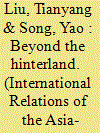

|
|
|
|
|
| Summary/Abstract |
The scholarly literature on paradiplomacy has tended to focus overly on subnational governments in federal systems rather than those in unitary and centralized countries. However, it is important to note that some subnational governments in these countries have been increasingly proactive in international relations (IR). This study explores the paradiplomatic activities of Yunnan, a province in the south of China which, since the early 1990s, has actively engaged in cross-border cooperation. Combining the concept of paradiplomacy with the theory of actorness, this study first argues that Yunnan has been incentivized to conduct paradiplomacy through the decision of Beijing to open China’s borders; the inefficiency of the central government in managing border-related issues; and the interprovincial competition over economic and diplomatic clouts in the Mekong subregion. Second, this study argues that Yunnan’s new external affairs powers have been consolidated by a host of new opportunities stemming from the external environment. Third, it argues that Yunnan’s new external affairs powers have enabled it to leverage two broad instruments (infrastructure development and economic statecraft) to make neighboring countries more dependent on cooperation with it. And finally, it is argued that Yunnan’s role as an IR player has been acknowledged both by neighboring countries and by Beijing.
|
|
|
|
|
|
|
|
|
|
|
|
|
|
|
|
| 2 |
ID:
139397


|
|
|
|
|
| Summary/Abstract |
This article sheds light on the complexity of international climate change negotiations in a federal country, like Canada, where there is no clear attribution of full power over international negotiation concerning this issue. Climate change is a multi-level and multi-stakeholder issue, one that can only be tackled successfully if all actors, at all levels of government, are involved in the process. In recent years, Canadian provinces, especially Québec, have become intensely involved in climate change paradiplomacy. That situation has led to a Canadian paradox where the Government of Québec worked to respect the Kyoto Protocol and act accordingly, while Canada opted out of the Protocol in 2011.
|
|
|
|
|
|
|
|
|
|
|
|
|
|
|
|
| 3 |
ID:
179542


|
|
|
|
|
| Summary/Abstract |
The globalised Arctic has in recent years witnessed an influx of extra-regional actors, many of whom come from East Asia. Although there is an abundance of analysis of the roles of East Asian nation-states—including Japan and China—in Arctic governance and resource development, research on East Asian subnational governments’ (SNGs) increased Arctic engagement has not drawn much attention. Leaning on the concept of paradiplomacy and being particularly inspired by Alexander S. Kuznetsov’s explanatory framework for the study of SNGs’ involvement in international relations, this study examines the motives behind East Asian subnational governments’ involvement in Arctic affairs and the attitudes of national governments towards this involvement. Based on the study of Hokkaido Prefecture in Japan and the provinces of Heilongjiang, Jilin and Liaoning in China, this article argues that the East Asian SNGs’ Arctic initiatives are mainly based on economic objectives, especially those connected with new transportation routes in the Arctic Ocean. Scientific cooperation also plays an important role in the evolving subnational Arctic engagement. At the national level, East Asian SNGs are actively interacting with their respective central governments, which have, in general, been supportive of their Arctic endeavours.
|
|
|
|
|
|
|
|
|
|
|
|
|
|
|
|
| 4 |
ID:
153188
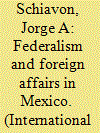

|
|
|
|
|
| Summary/Abstract |
This article analyzes the international negotiations of sub-State governments (INSSG) in Mexico. It addresses five questions: 1) What factors explain the increasing number of INSSGs? 2) What is the impact of federalism on INSSG? 3) What are the levels of INSSG and how have they changed over the years? 4) How do Mexican sub-State governments (SSG) institutionalize their international negotiations? 5) What are the perceptions and capacities of the SSG in their internationalization process? The study explains the growth of INSSG due to democratization, arguing that renewed Mexican federalism has generated incentives for SSGs to participate more intensively in international negotiations. It analyzes the wide variation in the INSSG and explains how it has evolved over the last decade. It focuses on the analysis of Inter-Institutional Agreements (IIA) and explains the perceptions and capacities of Mexican SSG to conduct international negotiations.
|
|
|
|
|
|
|
|
|
|
|
|
|
|
|
|
| 5 |
ID:
114194


|
|
|
|
|
| Publication |
2012.
|
| Summary/Abstract |
This paper discusses the contemporary sovereignty experience of small states and territories in the context of unfolding 'strategy games'. This paper charts and illustrates some of the most salient issues over which this dynamic is played out, using binary (small state versus big state) relations as its analytic constituency. These practices are understood as part of the evolution of the conduct of government, or governmentality, as envisaged by Michel Foucault: states, no longer concerned with threats to their very existence, can flex their clout extra-territorially, and in so doing provide new and creative opportunities, but also raise threats, for the exercise of sovereignty.
|
|
|
|
|
|
|
|
|
|
|
|
|
|
|
|
| 6 |
ID:
159573
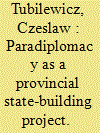

|
|
|
|
|
| Summary/Abstract |
This article examines Yunnan’s relations with the Greater Mekong Subregion (GMS) countries grouped in the Asian Development Bank’s (ADB) GMS Program. While locating the analysis in the context of paradiplomacy, this article makes two claims. First, it argues that—unlike subnational governments in federal states—Yunnanese authorities do not use domestic opportunity structures to develop the province’s international agency. Instead, they pursue paradiplomacy as a subnational state-building project, designed to extract economic assistance from the central state. Second, it asserts that—unlike other Westphalian states—the Chinese government has recognized the benefits of paradiplomacy as a way to enhance the structural competitiveness of its borderland provinces in the regional economy. In doing so, it has proactively deployed provincial authorities in the multilevel governance of the GMS Program. At the same time, the central government has remained at the center of Yunnan’s external relations through providing funding and preferential policies for Yunnan’s internal and external economic projects and defining the parameters of Yunnan’s cooperation with the GMS countries and the ADB.
|
|
|
|
|
|
|
|
|
|
|
|
|
|
|
|
| 7 |
ID:
152460
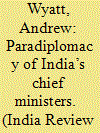

|
|
|
|
|
| Summary/Abstract |
Since the mid-1990s, state governments within India’s federal system have taken a greater interest in foreign relations. They have sought indirect influence by lobbying the central government to take account of their preferences and direct influence by seeking investment and making links with international organizations and other national and subnational governments. This article considers how chief ministers engage in parallel diplomacy noting how they draw on regional cultural resources and make connections with a regionally defined diaspora. The article finds that some chief ministers have embraced the role of “chief diplomat,” while others take a more discreet approach to international activity. Comparing the cases of Andhra Pradesh, Kerala, and Tamil Nadu reveals the political logic for expanding, de-emphasizing, or avoiding international engagement.
|
|
|
|
|
|
|
|
|
|
|
|
|
|
|
|
| 8 |
ID:
156758


|
|
|
|
|
| Summary/Abstract |
Since 1983, no non-self-governing island connected to a (neo-) colonial European or American metropole has acquired full Westphalian sovereignty and these islands continue to operate within constitutional frameworks that connect them to these metropoles. Large majorities in referendums on several of these islands have rejected full sovereignty. This paper opens with a review of the essential elements of the concept of sovereignty in a historical and global context, before studying how sovereignty is unfolding in new forms in non-self-governing islands in the Pacific and the Caribbean. As a case study, an analysis is presented of how pro-France (loyaliste) and pro-independence (indépendantiste) parties in New Caledonia are negotiating sovereignty with France. Evidence is given of how these New Caledonian parties are creatively using classic Westphalian signifiers of sovereignty normally reserved for sovereign states such as flags, diplomatic representations and international treaties, while still negotiating New Caledonia's sovereignty with France. This suggests that in contrast to Westphalian sovereignty, a unique ‘Islandian’ concept of sovereignty is emerging. Islands that are not sovereign in a Westphalian sense can creatively disassemble and reassemble signifiers of Westphalian sovereignty to strengthen their continuous negotiations with their metropoles and their neighbours.
|
|
|
|
|
|
|
|
|
|
|
|
|
|
|
|
| 9 |
ID:
183367
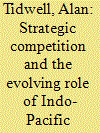

|
|
|
|
|
| Summary/Abstract |
Scholarship on paradiplomacy, or sub-national diplomacy, has often focused on economics, trade, cooperation and politics. The deepening of strategic competition between the People’s Republic of China and the United States has raised the stakes for sub-national diplomacy. While US-PRC strategic competition occurs primarily at the national level, the subnational level plays an important role in terms of creating opportunities for influence and advancing the strategic interests. In this article recent paradiplomacy in the Indo-Pacific is examined, as is the is the intersection of paradiplomacy with strategic competition.
|
|
|
|
|
|
|
|
|
|
|
|
|
|
|
|
| 10 |
ID:
153190
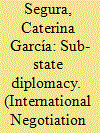

|
|
|
|
|
| Summary/Abstract |
The Spanish self-governing regions’ international actions date back as far as the 1980s. Together with the Basque Country, Catalonia is the Spanish self-governing region with the most active trajectory of international action. Catalan international action, which is a pioneer in the Spanish context, came to be slowly but progressively accepted as a normalized form of conduct by the Spanish state, as was the international action of other Spanish self-governing regions. Nevertheless, this normalization did not eliminate conflict, which continued to surface, though sporadically and without representing significant problems. However, things appear to have changed recently. Since 2012, Catalonia has been immersed in the process of independence or national transition. In this context, the Catalan Government’s international action has taken new directions and created new instruments. For the first time in the history of Catalonia’s international action, we witness clear signs of protodiplomacy.
|
|
|
|
|
|
|
|
|
|
|
|
|
|
|
|
| 11 |
ID:
180651
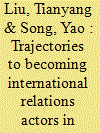

|
|
|
|
|
| Summary/Abstract |
While Chinese paradiplomacy has received growing academic attention, little is known about how different provinces within China act as international relations players of their own accord. This paper adopts a comparative perspective to address this gap. It develops three dimensions of international actorness (authority, motivation, and instruments) to examine whether and how Chinese provinces have satisfied the criteria for being international relations actors through their engagements in the Belt and Road Initiative (BRI). Using Guangdong and Yunnan as examples, this paper casts light on the plural occasions in which the de-centralized state control of foreign affairs and the growing external activism of provincial entities have worked in tandem to widen the footprints of said provincial entities in the countries of the BRI. Drawing on Guangdong-Hong Kong competition and Yunnan-Guangxi rivalry, this paper unpacks the motivations of provincial engagements in the BRI by exploring the utility of imitation tactics used to gain comparative advantages vis-à-vis their domestic counterparts. While comparing the Guandong and Yunnan’s leveraging of strategic instruments, this paper also reveals Guangdong’s strong globalist, mercantile mentality in its external interactions, in contrast with the more regionalist and stability-oriented approach of Yunnan.
|
|
|
|
|
|
|
|
|
|
|
|
|
|
|
|
|
|
|
|
|